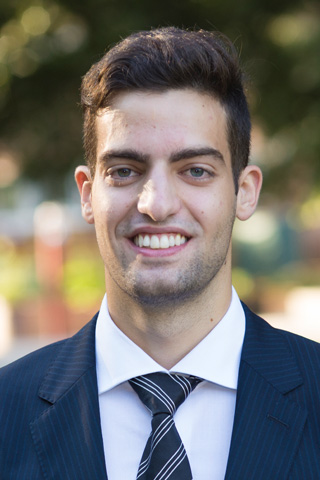Claudio Rizzi, a doctoral candidate in the University of Miami Patti and Allan Herbert Business School, was recently awarded a $20,000 top prize from BlackRock, a leading investment and risk management firm, for his study “Nature as a Defense from Disasters: Natural Capital and Municipal Bond Yields.”
The research coupled the business student’s passion for sustainability issues with his financial markets savvy.
“We know that global warming has serious implications on economies worldwide, and in the financial literature we have studied climate risk. But we don’t know much about how nature loss affects financial markets,” Rizzi explained.
His study explored wetland and forest areas throughout the contiguous United States with special focus on areas of Florida, Texas, and Louisiana—states prone to high precipitation—and found that locations that experience a loss of natural areas also see an increase in borrowing costs.
“This is because when wetlands are converted into development (apartments, roads, and schools, etc.) the nearby city or county loses the ability to mitigate flood risk and flood damages,” Rizzi explained. “A wetland absorbs water and avoids flood damage, yet if it has been converted into a cemented area, future flooding will be worse.

“Not only do these counties experience increases in water damage estimated in the amount of $15,000 per one-hectare loss of wetlands, but the municipal and county governments also experienced increased borrowing costs—11 percent higher interest on average.”
A native of Italy, Rizzi grew up listening to his grandparents, both longtime farmers, complain about the increasingly hotter and dryer temperatures that year by year sapped their farmland soil of its fertility.
The shifting climate was a common complaint in the southeastern Italian province of Bari, and his grandparents eventually closed their farming activities as a result of the debilitating conditions.
“It wasn’t until years later that, from watching the news, they realized that it was more than a local problem—the hotter temperatures were happening on a world scale,” Rizzi said. “It blew their mind to realize how widespread it was.”
As Rizzi grew older, he studied and learned more about the scope and the scale of climate change. He likewise developed an impressive expertise for finance and traveled to the United States to earn both undergraduate and graduate degrees in the field.
When it came time to choose a doctoral program, the Miami Herbert Business School’s dedication to sustainability issues and strength in behavioral finance sparked his attention.
“I want to contribute in some way in the fight against global warming and climate change,” he said. “I have skills in finance and an interest in the environment—that’s the way I approach the financial world.”
He spent his first two years focused on coursework then, for his dissertation, wanted to use his finance acumen to focus on climate change.
Alok Kumar, Gabelli Asset Management Chair and finance professor, served as Rizzi’s principal advisor. Kumar initially urged Rizzi to focus his research on behavioral finance or another area.
“I was worried that he might not have much guidance from me or anyone else in the department because none of us are experts in the area he wanted to investigate,” Kumar explained. “But he disagreed with me, with us actually, and chose his own path and made it very successful.”
Kumar noted that sustainability is a hot issue and that BlackRock is one of the leaders in exploring the area of sustainability and finance.
“The problem is that sustainability is not easy to quantify. And if you don’t have the data, then even if you have great ideas, it’s not easy to conduct research. But Claudio figured out how to do it,” Kumar said.
For the award, Rizzi competed first against a field of some 40 contestants Five finalists traveled to BlackRock’s New York headquarters to present to a panel of the firm’s officers and economic and finance experts from different universities.
His job market paper that won the prize is part of his overall dissertation that is comprised of three essays or working papers, he explained.
Rizzi is currently seeking a first faculty position. Most programs do not hire Ph.D. students directly after graduation, so he is entertaining options from colleges around the United States and in Europe.
Kumar applauded Rizzi’s persistence to research what he was most interested in and said that the BlackRock prize lends visibility to the University and to the business school, in particular.
““He didn’t choose the less risky path—instead he followed his passion,” Kumar said. “Maybe the prize will encourage others to follow this path. It’s certainly going to help create a positive image at school.”

